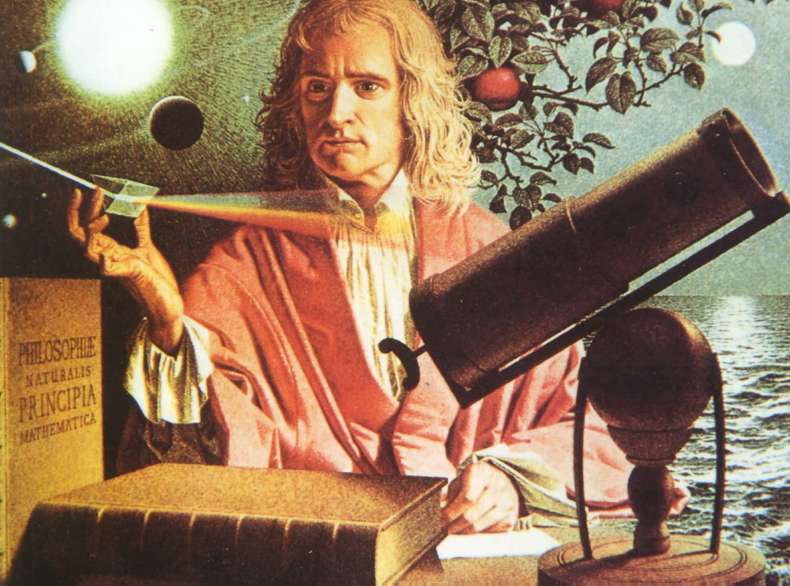Newton was a decidedly odd figure—brilliant beyond measure, but solitary, joyless, prickly to the point of paranoia, famously distracted (upon swinging his feet out of bed in the morning he would reportedly sometimes sit for hours, immobilized by the sudden rush of thoughts to his head), and capable of the most riveting strangeness.
牛頓絕對是個怪人--他聰明過人,而又離群索居,沉悶無趣,敏感多疑,注意力很不集中(據說,早晨他把腳伸出被窩以后,有時候突然之間思潮洶涌,會一動不動地坐上幾個小時),干得出非常有趣的怪事。

He built his own laboratory, the first at Cambridge, but then engaged in the most bizarre experiments. Once he inserted a bodkin—a long needle of the sort used for sewing leather—into his eye socket and rubbed it around "betwixt my eye and the bone as near to [the] backside of my eye as I could" just to see what would happen. What happened, miraculously, was nothing—at least nothing lasting. On another occasion, he stared at the Sun for as long as he could bear, to determine what effect it would have upon his vision. Again he escaped lasting damage, though he had to spend some days in a darkened room before his eyes forgave him.
他建立了自己的實驗室,也是劍橋大學的第一個實驗室,但接著就從事異乎尋常的實驗。有一次,他把一根大針眼縫針--一種用來縫皮革的長針--插進眼窩,然后在"眼睛和盡可能接近眼睛后部的骨頭之間"揉來揉去,目的只是為了看看會有什么事發生。結果,說來也奇怪,什么事兒也沒有--至少沒有產生持久的后果。另一次,他瞪大眼睛望著太陽,能望多久就望多久,以便發現對他的視力有什么影響。他又一次沒有受到嚴重的傷害,雖然他不得不在暗室里待了幾天,等著眼睛恢復過來。
Set atop these odd beliefs and quirky traits, however, was the mind of a supreme genius—though even when working in conventional channels he often showed a tendency to peculiarity. As a student, frustrated by the limitations of conventional mathematics, he invented an entirely new form, the calculus, but then told no one about it for twenty-seven years. In like manner, he did work in optics that transformed our understanding of light and laid the foundation for the science of spectroscopy, and again chose not to share the results for three decades.
與他的非凡天才相比,這些奇異的信念和古怪的特點算不了什么--即使在以常規方法工作的時候,他也往往顯得很特別。在學生時代,他覺得普通數學局限性很大,十分失望,便發明了一種嶄新的形式--微積分,但有27年時間對誰也沒有說起過這件事。他以同樣的方式在光學領域工作,改變了我們對光的理解,為光譜學奠定了基礎,但還是過了30年才把成果與別人分享。











